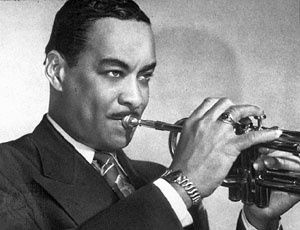Clayton, Buck
American musician
byname of Wilbur Dorsey Clayton
born Nov. 12, 1911, Parsons, Kan., U.S.
died Dec. 8, 1991, New York, N.Y.
 African-American jazz musician who was the star trumpet soloist of the early, classic Count Basie (Basie, Count) orchestra and, thereafter, was an outstanding soloist and successful arranger.
African-American jazz musician who was the star trumpet soloist of the early, classic Count Basie (Basie, Count) orchestra and, thereafter, was an outstanding soloist and successful arranger.At age 21 Clayton moved to California, where he played trumpet and organized one of the first jazz bands to play an extended Asian engagement, in Shanghai, China (1934–36). He then joined Count Basie in 1936 and remained with the band until 1943, through Basie's greatest period, during which time Clayton also played in important Billie Holiday (Holiday, Billie), Teddy Wilson, and Lester Young (Young, Lester) recordings. Louis Armstrong (Armstrong, Louis) was Clayton's principal early inspiration, though Clayton abandoned Armstrong's dramatic qualities, preferring to concentrate on melody. A cup mute frequently gave his trumpet a distinctive swing-era sound, while his open-horn playing was warm and masterful. He also arranged for the Basie band (“Goin' to Chicago Blues”).
After playing in U.S. Army bands in 1943–46, Clayton became one of the most active swing players of the postwar years, touring Europe and playing in America with the Jazz at the Philharmonic troupe, as leader of his own groups, and as sideman with Jimmy Rushing, Benny Goodman, and others. He led bands of swing soloists in a noted series of “jam session” recordings, including The Hucklebuck/Robbins' Nest (1953) and All the Cats Join In (1956). After illness forced him to give up the trumpet, he taught at Hunter College, New York City, and led bands that played his arrangements. His autobiography (written with Nancy Miller Elliott), Buck Clayton's Jazz World (1986), includes a discography.
- marigold
- Mariinsky Ballet
- Marijampolė
- marijuana
- Mari Jászai
- Mari language
- Marillac, Saint Louise de
- Marilyn Horne
- Marilyn Miller
- Marilyn Monroe
- marimba
- Marina
- Marina Ivanovna Tsvetayeva
- Marin Alsop
- Marinatos, Spyridon
- Marin, Biagio
- Marinduque
- marine
- Marine Biological Laboratory
- marine biology
- marine ecosystem
- marine geology
- marine geophysics
- marine insurance
- Marineland of Florida